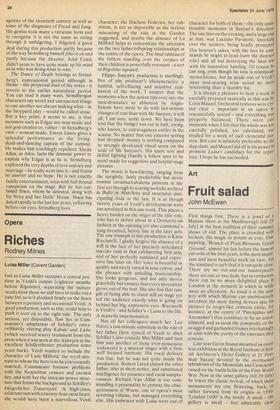Opera
Riches
Rodney Milnes
Luisa Miller (Covent Garden)
Just as Luisa Miller occupies a central position in Verdi's output (eighteen months before Rigoletto), separating the mature works from those we still have to make out a case for, so is it plonked firmly on the fence between repertory and occasional Verdi. A good production, such as this, could help to push it over on to the right side. The only serious, yet disputable, flaw lies in Cammarano's adaptation of Schiller's extraordinarily stirring play Kabale und Liebe (which received scurvy treatment from the press when it was seen at the Aldwych in the excellent Schillertheater production some years back). Verdi wanted to include the • character of Lady Milford, the royal mistress to whom the hero is to be conveniently married; Cammarano •foresaw problems with the Neapolitan censors and excised her, and with her the intricate power structure that forms the background to Schiller's biirgerliches Trazterspiel. A high-class, reluctant tart with a twenty-four carat heart, she would have been a marvellous Verdi character; the Duchess Federica, her substitute, is not as impossible as the serious miscasting of the role at the Garden suggested, and maybe the absence of La Milford helps to concentrate the attention on the two father/offspring relationships at the centre of the opera. The final tableau of the fathers standing over the corpses of their children is powerfully resonant —a sort of Rigoletto squared.
Filippo Sanjust's production is startlingly free of any producer's idiosyncracies: a faithful, self-effacing and sensitive realisation of the work. I suspect that the moments when the action tips over into the melodramatics so abhorred by AngloSaxons have more to do with last-minute changes of cast than with Mr Sanjust; it will all, I am sure, settle down. We have been told that the budget was cut in half, owing, who knows, to extravagances earlier in the season. No matter that one exterior setting was dropped: money is nothing compared to strongly developed visual sense on the scale of Mr Sanjust's. His spare sets and skilful lighting (hardly a follow spot to be seen) made for suggestive and helpful stage pictures.
The music is bewildering, ranging from the sprightly, fairly predictable but never routine cavatina/cabaletta patterns in the first act through to soaring melodic arches la Ballo in Maschera and structures anticipating Aida in the last. It is as though twenty years of Verdi's development were encapsulated in this one work. This places a heavy burden on the singer of the title-role, who has to skitter about in a Donizetti-ish fashion at the opening yet also command a long-breathed, heroic line in the later acts. The one triumph in this production is Katia Ricciarelli. I gladly forgive the absence of a trill in the face of her precisely articulated staccato runs in that exhilarating first aria, and of her perfectly sustained and expressive line later on. Her voice is beautiful in quality and nicely varied in tone colour, and she phrases with unfailing musicianship. She looks gorgeous, and not only moves gracefully but ensures that every movement grows out of the text. She also has that rare gift of being able to stand still on stage yet tell the audience exactly what is going on behind her big, expressive eyes. Ricciarelli is Verdi's — and Schiller's — Luisa to the life. A masterly impersonation.
• Not all her colleagues match her. Leo Nucci, a last-minute substitute in the role of her father (how typical of Verdi to ditch Schiller's low-comedy Mrs Miller and turn him into another of those over-possessive widowers) is a musical singer with a firm, well focused baritone. His vocal delivery was fine, but he was not quite inside the production. Robert Lloyd played the other father, also at short notice, and substituted intelligence for presence and vocal sumptu ousness. Richard Van Allan is too commanding a personality to portray the obsequiousness of Wurm, one of opera's most revolting villains, but managed everything else. His embraces with Luisa were out of
character for both of them — the only ques' tionable moments in Sanjust's direction, The one blot on the evening, and a large one at that, was Luciano Pavarotti, knocking over the scenery, being loudly prompted (for heaven's sakes, with the fees he cora' mands he might at least learn the damned role) and all but destroying the final trio with his insensitive bawling. Of course he can sing, even though his tone is relentlesslY monochrome, but he made one of Verdi's most soul-searing arias sound no more interesting than a laundry list.
It is always a pleasure to hear a work as carefully prepared musically as this was bY Lorin Maazel. Orchestral textures were crY' stal clear — important in an opera so resourcefully scored — and everything was properly balanced. There were just moments when I felt that the whole was too carefully polished, too calculated, too studied for a work of such elemental pas' sion. But care is infinitely preferable to the slap-dash, and Maazel did all in his power to promote Luisa's candidacy for the reper' tory. I hope he has succeeded.














































 Previous page
Previous page